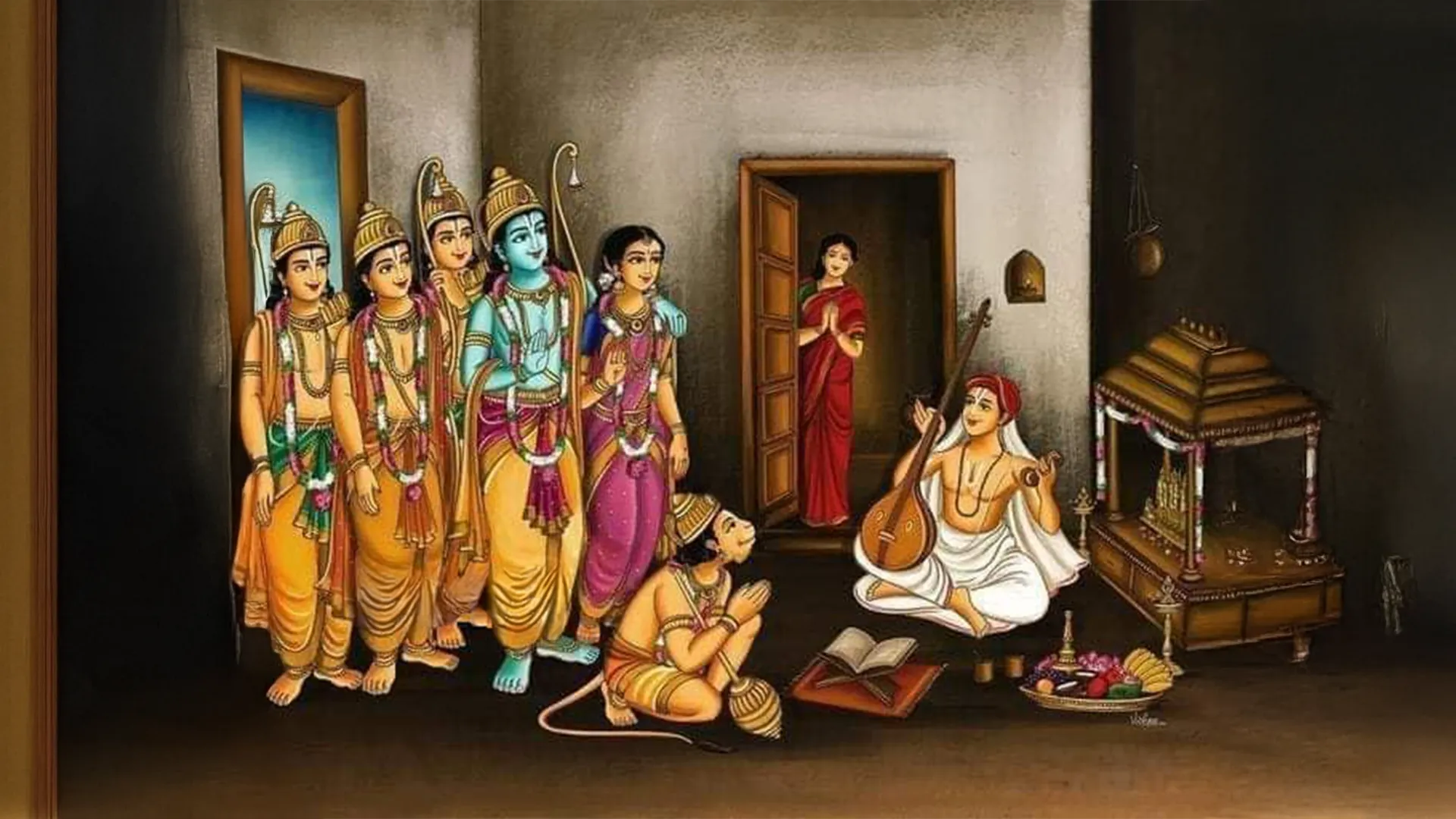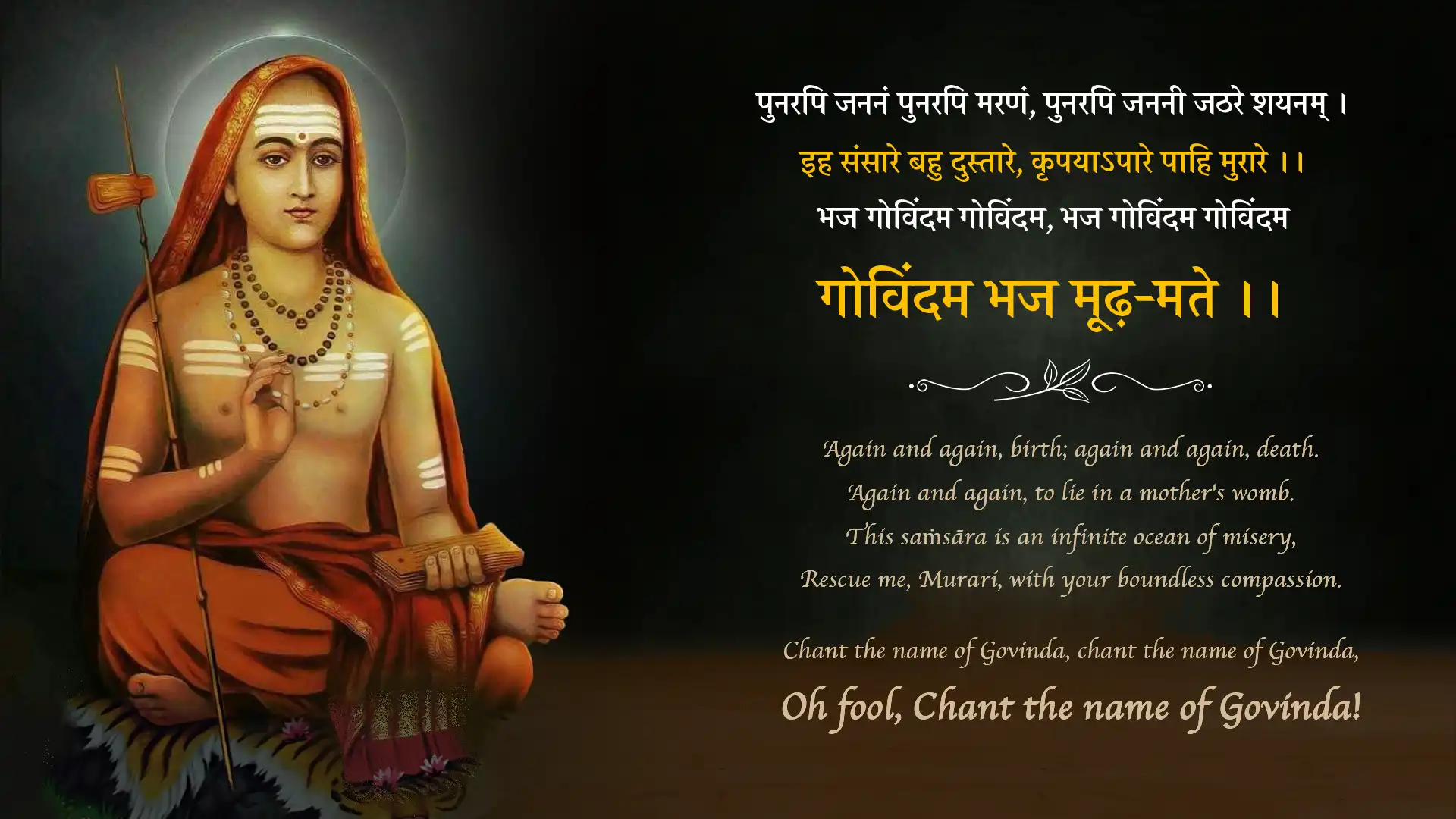The image of Tyagraj—lost in divine Samadhi, Tanpura in hand, eyes closed in soulful surrender to Lord Ram—is etched into the hearts of every Carnatic music lover. But more than just a composer, Tyagraj was a spiritual luminary. His music did not emerge from ambition or artistic pursuit—it flowed from a heart steeped in devotion. Let us walk through the life of this saint-poet and draw strength from his story.
A Divine Beginning
Tyagraj was born on May 4, 1767, in a Telugu family in Thiruvarur, a town in Tamilnadu's culturally rich Thanjavur district. Even as a child, his life was steeped in bhakti (devotion) and music. His guru, Sonti Venkataramanayya, himself came from a lineage of court musicians. His father, Sonti Venkatasubbayya, was a renowned artist in the court of King Sarabhoji.
Tyagraj's genius soon revealed itself. His guru, eager to showcase this rare talent, once organised a gathering of elite musicians and music connoisseurs. What was meant to be a brief recital became an eight-hour musical marathon that left the audience utterly spellbound—so mesmerised that they completely forgot their scheduled royal performance. Such was the spiritual magnetism of Tyagraj's voice.
The King's Invitation — And Tyagraj's Dilemma
When the musicians failed to appear at court, King Sarabhoji was initially annoyed. But upon hearing of Tyagraj's breathtaking performance and the rapture it induced, his curiosity turned to admiration—and then desire. This was no ordinary performer. The king saw a divine opportunity to elevate his court's prestige.
He imagined a grand assembly—draped in luxury and flanked by scholars and dignitaries—where Tyagraj would sing praises of the king himself. His name would be immortalised through Tyagraj's divine voice. And so, messengers were sent with generous offers: land, gold, and the honour of royal patronage.
But Tyagraj did not see this as an honour—it was a spiritual crossroad. He responded not with defiance but with a soul-stirring kriti, speaking directly to his own heart:
"O my mind! Whom do you wish to praise?
A mortal king, or the King of all kings—Lord Ram?
Do you seek worldly rewards for the talents God has given,
Or will you offer them back in His service?"
His answer was clear: his voice was not for sale. It belonged to Ram alone.
A Test of Ego and Grace
The king's messengers returned, uneasy. Sarabhoji, whose political power was already diminishing under British influence, felt humiliated. His ego bruised, he initially ordered Tyagraj's execution. But divinity intervened. That very night, the king was struck by sudden, excruciating stomach pain. His advisors warned him that he had insulted a saint. Realising his grave mistake, the king went to Tyagraj, bowed at his feet, and begged forgiveness.
From that day onward, the king and the saint shared a bond of deep mutual respect.
The Golden Gift and Divine Protection
Tyagraj's fame now transcended borders. Devotees, kings, and commoners flocked to him. But the saint remained true to his vow of Tyag (renunciation).
One wealthy businessman, Kovar Sundar Mudaliar, wished to donate a thousand gold coins for the Ram Navami celebrations. Knowing Tyagraj's disinterest in wealth, he secretly convinced the disciples to carry the gold along with the festival goods.
While travelling, they passed through Nagalapuram, a village infamous for thieves who used slings to ambush and rob travellers. Soon, Tyagraj's group was surrounded. The disciples panicked and confessed, "Gurudev, we are carrying the gold coins meant for Ram Navami celebrations."
Tyagraj was momentarily shaken. The treasure was not his—it belonged to Ram. He quietly sat down, closed his eyes, and entered into deep prayer:
"O Ram, O Lakshman—this wealth is Yours.
If You wish it to be protected, You must guard it Yourself."
Divine Intervention
Miraculously, two mysterious horsemen appeared, bows in hand, and with celestial precision, drove the bandits away. The robbers, stunned and shaken, realised this was no ordinary rescue—it was divine.
Later that evening, they approached Tyagraj, fell at his feet, and confessed all. Awed by grace, they abandoned their ways and became his devotees. Tyagraj listened; his heart moved.
On one side, he rejoiced—the Lord had protected what was His, responding to a sincere prayer in the most wondrous way.
But on the other hand, a quiet sorrow filled his heart—
"Ram gave darshan to the thieves, but not to me, His lifelong servant."
Yet, he did not question. He accepted it as Ram's will. And from that surrender, he returned to his calling—to sing, to compose, to merge with the divine in every note.
A Saint Who Sang Light Into Darkness
His Music Wasn't Just Heard — It Was Felt
In another episode, Tyagraj once visited the king's palace. The ceremonial lamp remained unlit. With quiet reverence, he sang a composition in Raag Jyoti Swarupini, and legend says the lamp flickered to life—evoking the northern lore of Tansen and Raag Deepak.
The Legacy of Tyagraj
Tyagraj lived not for fame but for bhakti. He rejected royal honours, gold, and recognition—yet kings bowed to him, and his music still echoes through generations.
He showed the world that true music is not just heard—it is felt in the soul, offered in devotion, and capable of touching the divine.
Continue Your Spiritual Journey…
This soul-stirring collection brings to life the paths of 11 timeless saints, including Mirabai, Kabir, Ravidas, Soordas, Adi Shankaracharya, Tukaram, Andal, Ramanujacharya, Vallabhacharya, Purandara Dasa, and, of course, Tyagraj.




What our Participants say